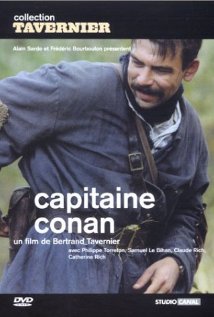
CAPTAIN CONAN
France, 1996, 129 minutes, Colour.
Philippe Torreton, Simon le Bihan, Claude Rich.
Directed by Bertrand Tavernier.
Captain Conan is a story of World War I. Philippe Torreton (who was to appear in Tavernier’s school drama Ca Commence Aujourd’hui) portrays an eccentric officer, a former seller of drapes, embracing the ethos of the war, with his own special squad, leading night missions which are very effective. He is a nonconformist, moving comfortably and uncomfortably between the ranks and the authorities. After the trench war, his squad is involved in skirmishes in Bulgaria and Romania, especially for fear of the expanding of the Russian Revolution. He defends his men who commit atrocities in the local towns. He has become friendly with a literature teacher, Norbert (Simon le Bihan), who wants to emulate Conan but is very much the academic and is well-mannered.
Conan does not take him his excursions but, after the war, when Norbert is persuaded by an arrogant general to become the local prosecutor, the two clash about the crimes of Conan’s men and how they will be treated in the courts.
Finally, there is an encounter with the enemy on a river, a brutal fight, using strategies that Conan had anticipated for this struggle. But, after the end of the fighting, Norbert comes back as a civilian to see Conan again – but, he is only a shell of himself, and has a terminal illness. He wants to be alone and to drink alone.
The film gives some background of the aftermath of World War I and the kind of fighting in Eastern Europe. But, this is very much a film for a French audience who would appreciate the nuances and the sensitivities in the story and the characters.
1. World War I and its aftermath? French involvement and experience? The allies and enemies? The war in the trenches, in Bulgaria and Romania?
2. The director’s career? Long? The variety of themes? His being considered a master?
3. War in the trenches, the vivid detail, night sequences? The military headquarters? Bulgaria, Romania, the feel, the open countryside, the towns, the military headquarters? The musical score?
4. The title, the focus on Conan, as a type, his background in selling drapes, his war service, involvement in the war? His special squad, his relationship with them, the types? In the trench? His going out on missions, his own authority, the scenes in the dark, the fights, the killings? His avoiding taking Norbert? The wounded, the hospitals? The headquarters, going for meals, the arrogant offices, Conan and his not wanting to stay, Norbert following him? The transition to Bulgaria, his warriors, their going over the top, brutality, sexual encounters? The skirmishes? The court sequences and his presence? His relationship with Norbert, Norbert and his court authority? Conan in defending his men? The different cases? His attitudes, attitudes towards authority, to the general? With Norbert, with the young man accused of cowardice? The finale, his strategy, the enemy coming over the river, the confrontation and fighting? The aftermath, his being alone, drinking, terminally ill, talking with Norbert, the prospect of death? His character as a symbol of the times?
5. The contrast with Norbert, in himself, dapper, literature teacher, involved in the war, wanting to fight from the trenches? His friendship with Conan, admiring him? Yet the differences? After the war, the prospect of him becoming the prosecutor, his reluctance, the alternate candidate being brutal, his accepting the role? The variety of crimes, investigating, the women and their being attacked, the visit to the prostitute and her holding court from her bed, the information? The men and their being called to the court? Accused of brutality? The role of Conan? The young man, accused of cowardice, his age? The young man condemned to death, dying in action? The encounters with his mother? Norbert in the final skirmish? His return in civilian clothes, the visit to Conan, their final discussions?
6. The young man, his age, his behaviour, accused of cowardice, condemned to execution, his dying in action?
7. His mother, her presence, cousin of the general, asserting influence, being assertive, the diplomatic responses to her, her pleading about her son, the final letter praising her son and his dying in action?
8. The general, the criticism of the French officers, arrogance, elite lifestyle, more interested in their meals and the food, their demands, not knowing much about the war? The general employing Norbert, Norbert offering his resignation, the general firing him? The general upset about the insistence from his cousin?
9. The film offering background to the French in World War I, the aftermath, the fear of the Russian Revolution spreading, the confrontations in Bulgaria and Romania? War and its ethos, the change at the end of World War I?